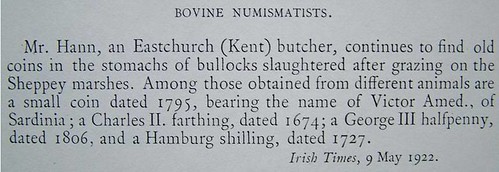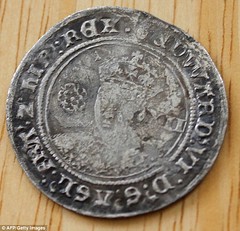
PREV ARTICLE
NEXT ARTICLE
FULL ISSUE
PREV FULL ISSUE
ON THE SIGNIFICANCE OF FOUND COINS
The item on the Elizabeth I coin found last week (and the wild speculation about its significance) generated several responses.
-Editor
Tom DeLorey writes:
On the Yahoo Colonial Coin group, David Menchell wrote: I doubt that the coin was placed there contemporaneously. The earliest European explorer to the area was Juan de Fuca; the British didn't get there until years later under James Cook and George Vancouver in the late 18th century. As far as the Vikings are concerned, they were busy on the coast of Labrador but didn't appear to venture farther south or west, certainly not on the Pacific coast. Here's another coin found in an unusual location. David Powell forwarded the following snippet from The Numismatic Chronicle of 1922:

David writes: As for the most bizarre and farflung findspot recorded for a British 17th cent token, Robert Thompson some years ago drew my attention to "a Reuters report entitled "Disc dated 1657 found inside shark", viz. the stomach of a five-foot shark caught off Galveston, Texas, in 1931, reported in the Morning Post of 9 September 1931, p.13, col.1, and followed by a letter on 12 September from A. J. Wood of Canterbury. The upshot was that the disc was identified as a specimen of Williamson's Kent 452, Richard Langley of Ramsgate."
So, who can offer up the funniest theory on what this "proves"? This could get interesting. And can anyone pass along reports of other numismatic items consumed by wildlife and subsequently rediscovered?
-Editor
To read the complete article, see:
EDWARD VI SHILLING FOUND VICTORIA, BRITISH COLUMBIA
(www.coinbooks.org/esylum_v17n10a23.html)
The Numismatic Bibliomania Society is a non-profit organization promoting numismatic literature. See our web site at coinbooks.org. To submit items for publication in The E-Sylum, write to the Editor at this address: whomren@gmail.com To subscribe go to: https://my.binhost.com/lists/listinfo/esylum All Rights Reserved. NBS Home Page Contact the NBS webmaster 
|
